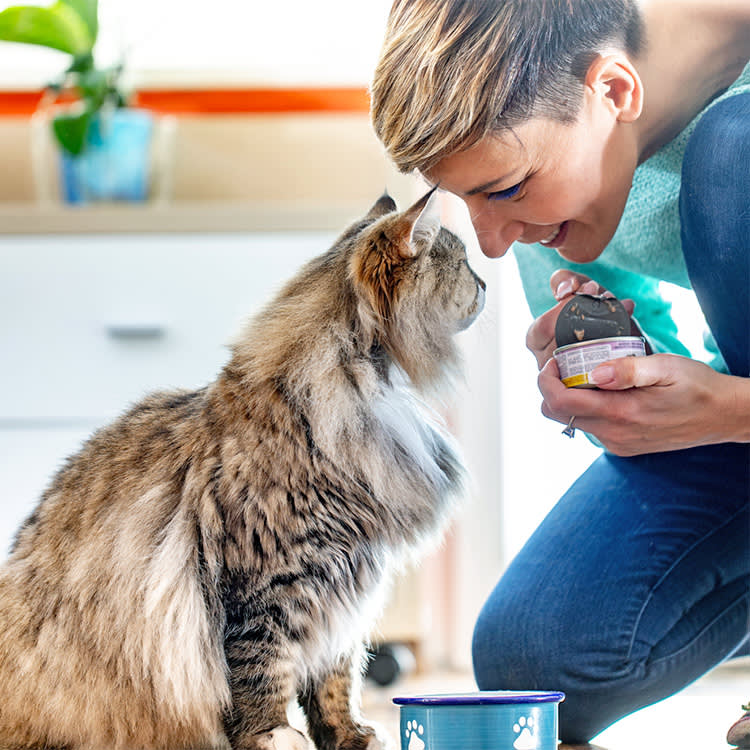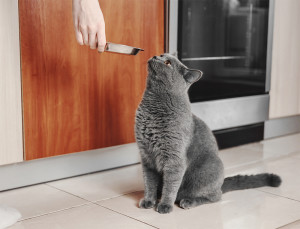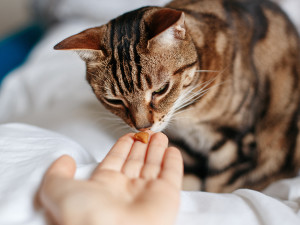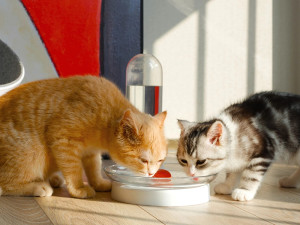The World’s Oldest Cat Had a Very Strange Diet—Did This Extend His Life?
Can bacon and wine help a cat live until the age of 38?

Share Article
Way back in 2005, a 38-year-old mixed tabby female named Creme Puff set the record for the world’s longest-living domestic catopens in a new tab, supplanting the previous record holder: a male Devon Rex-Sphynx mix named Grandpa Rex Allen, who lived to be 34. Both cats were adopted and cared for by retired Austin, Texas plumber Jake Perry — a prolific cat dad, who had as many as four dozen cats at a time, a third of which he claimed lived to be 30-plus years old — more than twice the average lifespan of a typical domestic cat.
Ten years after Creme Puff’s death, journalist Christina Couch interviewed a then-85-year-old Perry for a profile published by Atlas Obscuraopens in a new tab. In the article, Perry credited a special diet, created by him, for his cats’ super-longevity. A diet that included dry cat food, eggs, turkey bacon, broccoli, coffee with cream, and, every two days, an eyedropper of red wine to “circulate the arteries.”

Get (totally free) deals for food, treats, accessories, tech, and way more pet parenting must-haves.
opens in a new tabCouch was skeptical of Perry’s claims and spoke with his vet, Dr. Bruce Hardesty, who cared for 40 to 50 of Perry’s cats over a 15-year period, including Creme Puff. Dr. Hardesty conceded that the diet Perry developed was “not what they taught us in school” but confirmed that at least six of Perry’s cats had indeed lived to be 30 years old and that many more made it to 25. But was it really Creme Puff’s specially designed diet that was the cause? Dr. Hardesty couldn’t say, although he did speculate that, “[given] the kidneys are one of the weaker systems in the cat, [if] you gave them a little bit of diuretic, which caffeine [is], maybe that would help?” (Don’t worry; more on that later).
The longevity of Perry’s cats did not lead to new developments in cat care, and soon he and they faded from the public consciousness. That is until recently, when Perry’s story and the diet he created began popping up on social mediaopens in a new tab.
But just because there is renewed interest in Perry’s claims, doesn’t mean his diet actually works. Or does it? Kinship consulted two pet nutritionists to get their takes: Dr. Neus Torrent Ample, a veterinarian and pet nutritionist at Outdoor Bengalopens in a new tab; and Debbie Brookman, a clinical pet nutritionist at Pet’s Healthy Choiceopens in a new tab and Petworksopens in a new tab. Remember, though, that these nutritionists’ opinions are only that. You should speak to your own vet or veterinary nutritionist about what they think is right for your particular pets. Not to spoil the story, but wine and coffee are definitely not going to be on that list.
Does Perry’s cat diet actually make nutritional sense?
Cats are obligate carnivores, which means they need meat to survive. Ample and Brookman agree that meat-based diets built around fresh ingredients were best for cats, but went through Perry’s diet ingredient by ingredient to discuss its pros and cons in detail.
Dry cat food
Neither Ample nor Brookman were happy that Creme Puff wasn’t also getting a wet food or another nutrient to supplement his diet, too. Brookman says “kibble is the hardest food [for cats] to digest.”
“Carbs create inflammation in our cats leading to obesity, diabetes, and possibly kidney disease due to the dryness of the food,” Ample says. Both Ample and Brookman also point out that most cats don’t drink enough water opens in a new tabto live healthily on dry food alone.
Eggs
Ample and Brookman agree that eggs are a nutrient-denseopens in a new tab and highly digestible form of protein for cats, which Brookman suggests serving raw or soft boiled. “You could scramble them,” she says, “but never use a heated fat like butteropens in a new tab or olive oil. Heated fats can be very hard on the digestive system and the pancreas.”
Turkey bacon
Ample is OK with turkey bacon, on the condition that it is free of salt and seasonings. “As an animal-based product, turkey bacon contains proteins and fats that meet a cat’s natural nutritional needs,” she adds.
Brookman, however, believes turkey bacon should simply be avoided, because finding one that is actually minimally processed and lacks added salt and flavorings is more or less impossible.
Broccoli
Both agree that broccoliopens in a new tab (or leafy greens) could be beneficial to cats, but recommend it only make up around five percent of their overall diet. Brookman also suggests steaming or mincing greens to aid in digestion.
Coffee with cream
“Coffee should never be given to cats,” Ample says. “It provides no essential nutrients and contains caffeine, which is toxic to cats.”
Ample also pointed out that most cats are lactose intolerant, so giving them cream could cause digestive issuesopens in a new tab, though she says that if your cat can tolerate it, it’s fine to include some in their diet. Brookman agrees, but suggests giving them a small amount of plain Greek yogurt or plain Kefir in place of cream.
Red wine
Ample and Brookman agree: Red wine is obviously a hard no. “Alcohol is harmful to cats,” says Ample. “While red wine contains polyphenols (antioxidants), there are safer ways to provide them to your cat.”
Brookman adds: “Even a small amount of alcohol is risky for our felines, and it can be fatal if they are given too much.”
What should you feed your cats, according to nutritionists?
Ample and Brookman both recommend diets full of fresh meat. Ample suggests focusing on fresh white meat (chicken, turkey, or rabbit), fresh organ meats (especially liver and heart), a small amount of leafy greens, and fish (especially small, oily fishopens in a new tab, like sardines).
“There are commercial frozen or gently cooked cat foods available in your local independent pet store,” Brookman says. “A freeze-dried product, which you would rehydrate, can also be a convenient way to nourish your cat with the right nutrients. You would want to make sure to add additional filtered warm water, though. Our kitties do not like to eat cold food!”
If you can’t purchase raw food, Brookman suggests canned food with human-grade ingredientsopens in a new tab. “Remember, our cats are desert animals and do not have a thirst factor, which means they don’t stop to drink,” Brookman says. “We need to serve it to them in a moisture-rich diet. This can stop so many diseases and help our cats live a long life.”
Again, it’s best to talk to your vet about what they think is best for your cat when it comes to supplements and the nutrients in their food.
What ingredients should you avoid feeding your cats?
Ample suggests avoiding only feeding your cat fast-digesting carbohydrates like corn, wheat, cassava, rice, rice flour, or potatoes. “These can contribute to obesity, metabolic disorders like diabetes, and even increase the risk of cancer,” she says. Talk to your vet about how you can give your cat a balanced diet with all the nutrients they need, which includes the food you buy at the pet store.
She also says cat parents should always avoid sugar for their kitties.
What else can you do to help your cats live longer?
In addition to a healthy, species-appropriate diet, Ample suggests keeping your cats physically and mentally stimulated, being proactive with their health, and following all vaccination and deworming protocols “that are suited to your cat’s current immune status and risk of exposure.”
You should also do what you can to reduce your cat’s stressopens in a new tab because “stress and anxiety can weaken the immune system and lead to illness,” Ample says.
Did Creme Puff’s dad get anything right?
Although Ample and Brookman oppose certain elements of Perry’s diet plan, they agree that he did some things right — mostly in the ways he loved and cared for his cats.
“True love and awareness of the needs of your pet is so beneficial for a lifetime of health and happiness,” Brookman says.
Whatever the actual benefits of Jake Perry’s diet for Creme Puff and his other cats may or may not have been, there can be no doubt that he was a truly devoted cat dad who always put his cats first. And any cat would be lucky to have someone like that taking care of them, no matter how long they live.
References
Couch, Christina. “How to Raise a 165-Year-Old Cat.” Atlas Obscura, 15 Dec. 2015, www.atlasobscura.com/articles/how-to-raise-a-165-year-old-catopens in a new tab. Accessed 18 Dec. 2024.
“Oldest Cat Ever.” Guinness World Records, www.guinnessworldrecords.com/world-records/oldest-cat-everopens in a new tab.

Charles Manning
Charles Manning is an actor, writer, and fashion/media consultant living in New York City with his two cats, Pumpkin and Bear. Follow him on Instagram @charlesemanningopens in a new tab.
Related articles
![Hand holding food bowl peeks into frame as a cat looks up expectantly]() opens in a new tab
opens in a new tabThe Ultimate Puzzle: Picking the Right Cat Food
Four veterinary nutritionists pick apart the claims so that you can choose the right food for your kitty.
![A woman in a black and white striped shirt and jeans looking up ingredients from a bag of pet food on her phone in a pet store]() opens in a new tab
opens in a new tabWhat’s Actually On (and In) a Bag of Pet Food?
Want your pet to eat healthily? Dig in and learn how to read their food label.
![Young caucasian cheerful blonde girl sitting and hugging her lovely cocker spaniel dog in cafe.]() opens in a new tab
opens in a new tab10 Longevity Tips From People Whose Pets Have Lived Incredibly Long Lives
Follow these vet-backed tips to help your best bud live a healthy and full life.
![Woman feeding her kitten from a bowl at home.]() opens in a new tab
opens in a new tabWhat Is the Best Feeding Schedule for Cats?
Some helpful guidelines to follow.
![cat being offered a treat or vitamin]() opens in a new tab
opens in a new tabThe Best Supplements and Vitamins for Cat Health
Not your mama’s multivitamin.
![Two cats drinking from a KittySpring Combo water fountain on the floor]() opens in a new tab
opens in a new tabThe Best Cat Water Fountains
Fresh, flowing water will keep your pet hydrated, ward off UTIs, and reduce water waste.








